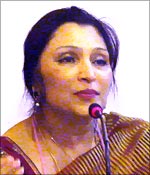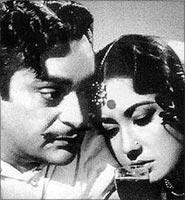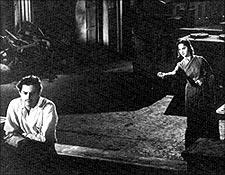|
|
| Help | |
| You are here: Rediff Home » India » Movies » Interviews » |
|
 Sathya Saran | ||
| |||||||||||||||||||||||
|
| |||||||||||||||||||||||
On the 83rd birth anniversary of legendary filmmaker Guru Dutt, Sathya Saran's book, Ten Years With Guru Dutt: Abrar Alvi's Journey was launched.
The book traces 10 years of Dutt's life, as seen through the eyes of Abrar Alvi, his close friend, scriptwriter and director of the classic, Sahib Biwi Aur Ghulam [Images].
Saran, editor of the DNA supplement Me, spoke to Patcy N about her book, and why youngsters would love to read it.
What made you write a book on Guru Dutt?
I read an article in the Indian Express, which had Abrar Alvi talking about Guru Dutt and his memories of him. It was quite fascinating. So I called Abrar Alvi and asked him whether I could meet him. He gave me an appointment very reluctantly, thanks to a mutual friend. After meeting him, I realised that he deserves more than just a story -- he deserves a book!
When did you start writing this book, as Abrar Alvi is so sick and forgetful these days?
I met Abrar in 2004, and finished writing a year ago. He was sick even when I met him. He would say I am getting senile but he can remember things with ease.
Sometimes, he would get agitated. Sometimes, he would get animated and would perform. So it was a lot of fun.
 Even though this is Abrar Alvi's story through your voice, Guru Dutt still shines through the book.
Even though this is Abrar Alvi's story through your voice, Guru Dutt still shines through the book.
In many films, we have a guest actor, who dies in the middle of the film but he overshadows the hero. This is like that. The book would not have happened without Guru Dutt. Till date, after 50 years, Abrar still misses Guru Dutt, and that whole creative period in his life. That's what makes the book so poignant. That is the reason why Abrar has never done anything as earth-shattering as Sahib Bibi Aur Ghulam.
Abrar Alvi comes across as a short-tempered person in the book, while Guru Dutt seemed like a light-hearted person.
Yes, Abrar Alvi would get angry quickly while Guru Dutt was very calm. That's why they got along well because opposites attract.
The book is full of anecdotes. Which one is your favourite?
There is one that shows a very unusual side of Guru Dutt -- it shows his sense of humour and that he loved playing practical jokes. There is an interesting anecdote about when they a practical joke on Abrar.
[Guru Dutt, Abrar and their friends were chatting in their office when a lady, in a burkha, came in to meet them. Abrar was in no mood to meet her but his friends insisted. When he met the lady, she kept saying that she was a huge fan of Guru Dutt and him, and wanted to work in a film. But when Abrar asked her to show her face, she was reluctant. Soon, Abrar lost his patience and lifted the lady's veil. Everyone started laughing, as the lady turned out to be Waheeda Rahman, carrying out Guru Dutt's prank].
What is the one thing you learnt about Guru Dutt through Abrar?
I learnt that Guru Dutt was a multi-faceted personality. I'd like to share an incident. Guru Dutt would call Abrar home in the middle of the night, and Abrar was used to that. One night, Guru Dutt called him home again urgently, and Abrar went, thinking that the director had some story idea or some catastrophe had happened. He went to Guru Dutt's home, and saw him sitting in absolute silence. Guru Dutt motioned Abrar to sit still, and see what he was staring at -- a chick coming of an egg.
Was he a tortured soul?
Guru Dutt comes across as a human with deep self-doubts. When Kaagaz Ke Phool failed, he was disappointed as he thought it was his magnum opus. Besides, both of them did research on the different ways of committing suicide. So it was always in his mind.
 Why didn't Guru Dutt make it clear that he had not ghost-directed Sahib Bibi Aur Ghulam, as is widely believed. Why is this clarification after 46 years?
Why didn't Guru Dutt make it clear that he had not ghost-directed Sahib Bibi Aur Ghulam, as is widely believed. Why is this clarification after 46 years?
I feel this story -- that Guru Dutt ghost-directed this film -- came after his death. These are stories built around a person because you want that person to look larger than life. Abrar has done a lot of work without credit. At the National Award function as well as the Berlin Film Festival, Abrar went up to collect the award for Best Director.
How angry was he about not getting credit for Sahib Bibi Aur Ghulam?
He would get angry very often. I would often make him understand that this book would put the record straight.
Reading a page from Guru Dutt's life
Guru Dutt, a Manglorian, was very influenced by
Yes. He dropped his surname, Padukone, and split his first name, Gurudutt, so that people would think he had a Bengali connection.
Abrar had said that whatever the story was, he would somehow take it to
How is the book relevant today? Do you think youngsters would like to read about Guru Dutt?
I think they will because it is a creative process being analysed. It is an excerpt from the chapter of the film history, which inflences filmmakers even today.
|
|
| © 2008 Rediff.com India Limited. All Rights Reserved. Disclaimer | Feedback |